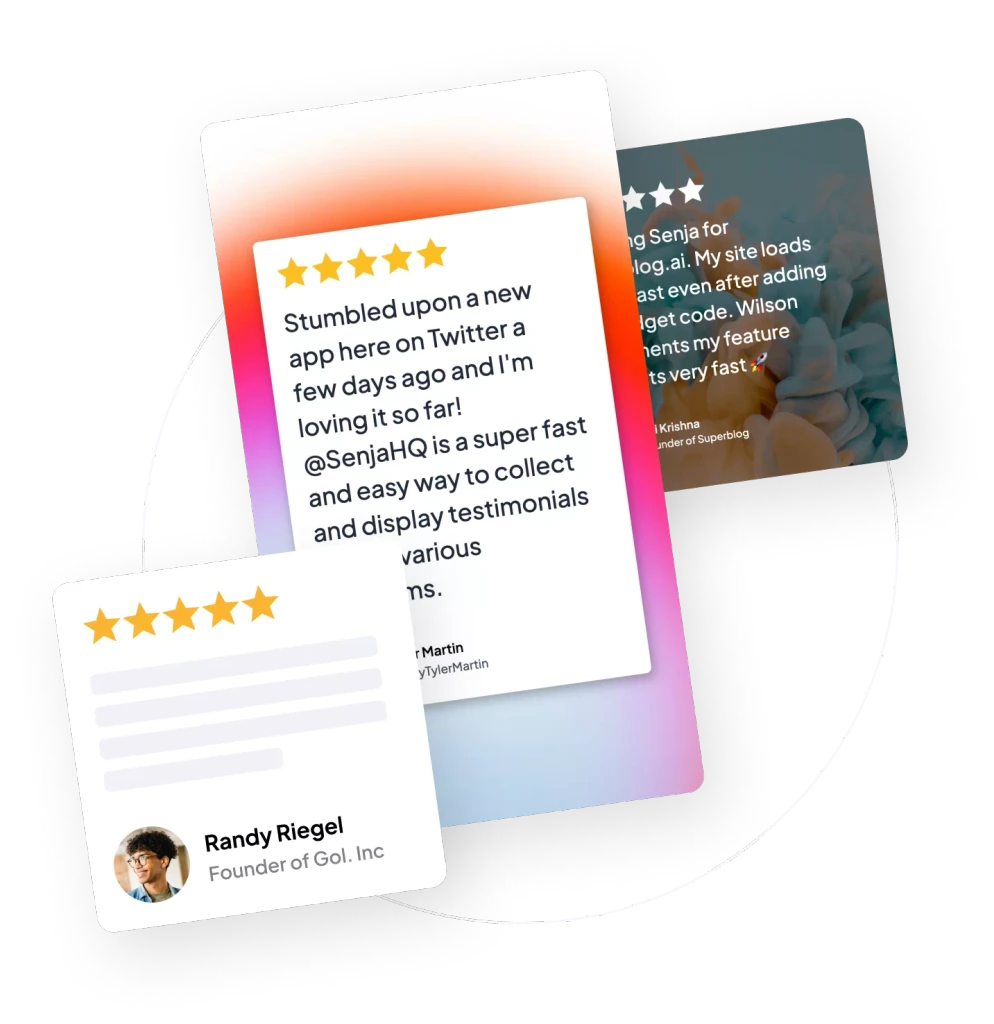The Testimonial Blog
The Testimonial Blog
Testimonial consent
Testimonial consent

Founder of Senja

Testimonial consent is a boring but critical part of testimonial collection.
Using a testimonial in your sales and marketing without consent can deeply damage your relationship with your customer.
And not being upfront about how and where you will use a testimonial can actually limit the number of testimonials you collect.
Here's what you need to know about getting permission to share your testimonial.
What is testimonial consent?
Testimonial consent is the process of seeking and receiving confirmation to use a customer testimonial across your sales and marketing.
This can be as simple as asking for consent over email, or as advanced as giving your customer granular control over what can be shared where. More on that later.
It's part of managing your testimonials.
Why collect testimonial consent?
Some customers do not want their testimonials shared publicly, for example on a website, or in an ad creative, but don't mind them shared privately, like in a sales document.
Others don't mind where you share if you remove their full name or company.
Others allow you to share far and wide without limits.
Whatever the customer wants, make sure you know and follow their requests.
Consent when importing testimonials
When you import a testimonial from another platform, like an app store, G2, Trustpilot or X, you do not have explicit permission to share that testimonial.
However because these platforms are public, it is safe to assume the customer is happy for their testimonial to be shared.
For extra peace of mind, consider linking back to the publicly posted version of the testimonial when sharing parts of it.
How to ask for consent?
This depends on where you ask for the testimonial.
Over email
In a form
You should use language like this:
I grant Company Name to edit and share my testimonial in their marketing and sales materials including but not limited to social posts, websites, and sales presentations.

You may also be sent a testimonial without being asked, which is great. However, reply back asking for explicit consent to share.
Granular consent

A more powerful way to collect testimonial consent is by allowing your customer to detail how each element can be shared.
You can use a matrix like this:
Full Name - share publicly, share privately (over emails, in pitches), don't share
Job title - share publicly, share privately (over emails, in pitches), don't share
Picture - share publicly, share privately (over emails, in pitches), don't share
Company - share publicly, share privately (over emails, in pitches), don't share
Testimonial - share publicly, share privately
The fact we are a customer - share publicly, share privately (over emails, in pitches), don't share
Using a format like this you can allow customer to leave you anonymous testimonials, or give them peace of mind that it won't be made public if they don't want it to. You will meet your customers' expectations and collect more social proof.
How to add collect testimonial consent with Senja
Senja is a free tool to collect, manage and share your testimonials. Senja has a function for your customers to agree consent.
Testimonial consent is a boring but critical part of testimonial collection.
Using a testimonial in your sales and marketing without consent can deeply damage your relationship with your customer.
And not being upfront about how and where you will use a testimonial can actually limit the number of testimonials you collect.
Here's what you need to know about getting permission to share your testimonial.
What is testimonial consent?
Testimonial consent is the process of seeking and receiving confirmation to use a customer testimonial across your sales and marketing.
This can be as simple as asking for consent over email, or as advanced as giving your customer granular control over what can be shared where. More on that later.
It's part of managing your testimonials.
Why collect testimonial consent?
Some customers do not want their testimonials shared publicly, for example on a website, or in an ad creative, but don't mind them shared privately, like in a sales document.
Others don't mind where you share if you remove their full name or company.
Others allow you to share far and wide without limits.
Whatever the customer wants, make sure you know and follow their requests.
Consent when importing testimonials
When you import a testimonial from another platform, like an app store, G2, Trustpilot or X, you do not have explicit permission to share that testimonial.
However because these platforms are public, it is safe to assume the customer is happy for their testimonial to be shared.
For extra peace of mind, consider linking back to the publicly posted version of the testimonial when sharing parts of it.
How to ask for consent?
This depends on where you ask for the testimonial.
Over email
In a form
You should use language like this:
I grant Company Name to edit and share my testimonial in their marketing and sales materials including but not limited to social posts, websites, and sales presentations.

You may also be sent a testimonial without being asked, which is great. However, reply back asking for explicit consent to share.
Granular consent

A more powerful way to collect testimonial consent is by allowing your customer to detail how each element can be shared.
You can use a matrix like this:
Full Name - share publicly, share privately (over emails, in pitches), don't share
Job title - share publicly, share privately (over emails, in pitches), don't share
Picture - share publicly, share privately (over emails, in pitches), don't share
Company - share publicly, share privately (over emails, in pitches), don't share
Testimonial - share publicly, share privately
The fact we are a customer - share publicly, share privately (over emails, in pitches), don't share
Using a format like this you can allow customer to leave you anonymous testimonials, or give them peace of mind that it won't be made public if they don't want it to. You will meet your customers' expectations and collect more social proof.
How to add collect testimonial consent with Senja
Senja is a free tool to collect, manage and share your testimonials. Senja has a function for your customers to agree consent.
Testimonial consent is a boring but critical part of testimonial collection.
Using a testimonial in your sales and marketing without consent can deeply damage your relationship with your customer.
And not being upfront about how and where you will use a testimonial can actually limit the number of testimonials you collect.
Here's what you need to know about getting permission to share your testimonial.
What is testimonial consent?
Testimonial consent is the process of seeking and receiving confirmation to use a customer testimonial across your sales and marketing.
This can be as simple as asking for consent over email, or as advanced as giving your customer granular control over what can be shared where. More on that later.
It's part of managing your testimonials.
Why collect testimonial consent?
Some customers do not want their testimonials shared publicly, for example on a website, or in an ad creative, but don't mind them shared privately, like in a sales document.
Others don't mind where you share if you remove their full name or company.
Others allow you to share far and wide without limits.
Whatever the customer wants, make sure you know and follow their requests.
Consent when importing testimonials
When you import a testimonial from another platform, like an app store, G2, Trustpilot or X, you do not have explicit permission to share that testimonial.
However because these platforms are public, it is safe to assume the customer is happy for their testimonial to be shared.
For extra peace of mind, consider linking back to the publicly posted version of the testimonial when sharing parts of it.
How to ask for consent?
This depends on where you ask for the testimonial.
Over email
In a form
You should use language like this:
I grant Company Name to edit and share my testimonial in their marketing and sales materials including but not limited to social posts, websites, and sales presentations.

You may also be sent a testimonial without being asked, which is great. However, reply back asking for explicit consent to share.
Granular consent

A more powerful way to collect testimonial consent is by allowing your customer to detail how each element can be shared.
You can use a matrix like this:
Full Name - share publicly, share privately (over emails, in pitches), don't share
Job title - share publicly, share privately (over emails, in pitches), don't share
Picture - share publicly, share privately (over emails, in pitches), don't share
Company - share publicly, share privately (over emails, in pitches), don't share
Testimonial - share publicly, share privately
The fact we are a customer - share publicly, share privately (over emails, in pitches), don't share
Using a format like this you can allow customer to leave you anonymous testimonials, or give them peace of mind that it won't be made public if they don't want it to. You will meet your customers' expectations and collect more social proof.
How to add collect testimonial consent with Senja
Senja is a free tool to collect, manage and share your testimonials. Senja has a function for your customers to agree consent.

Collecting testimonials doesn't get much easier
Collect text and video testimonials — Share them everywhere!
Sign up for free
More Articles
Testimonials Made Easy
The faster, easier way to collect testimonials
Jump in today and see how easy it is to collect testimonials with Senja.

Testimonials Made Easy
The faster, easier way to collect testimonials
Jump in today and see how easy it is to collect testimonials with Senja.
Testimonials Made Easy
The faster, easier way to collect testimonials
Jump in today and see how easy it is to collect testimonials with Senja.



